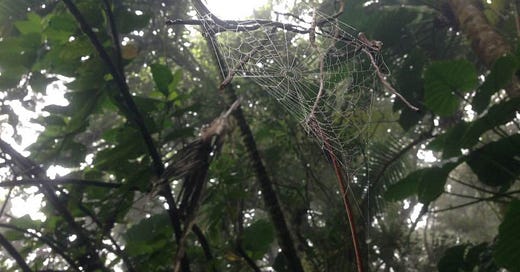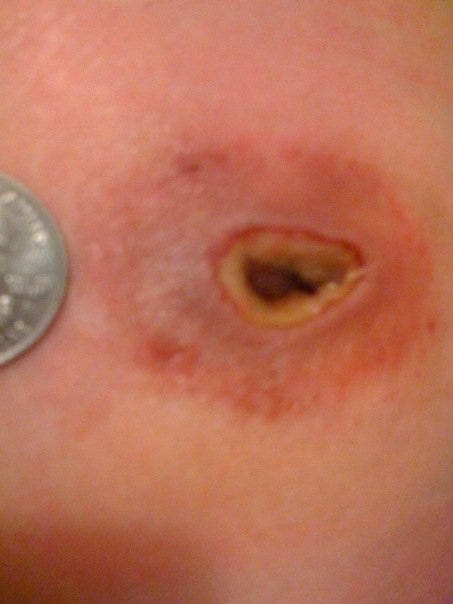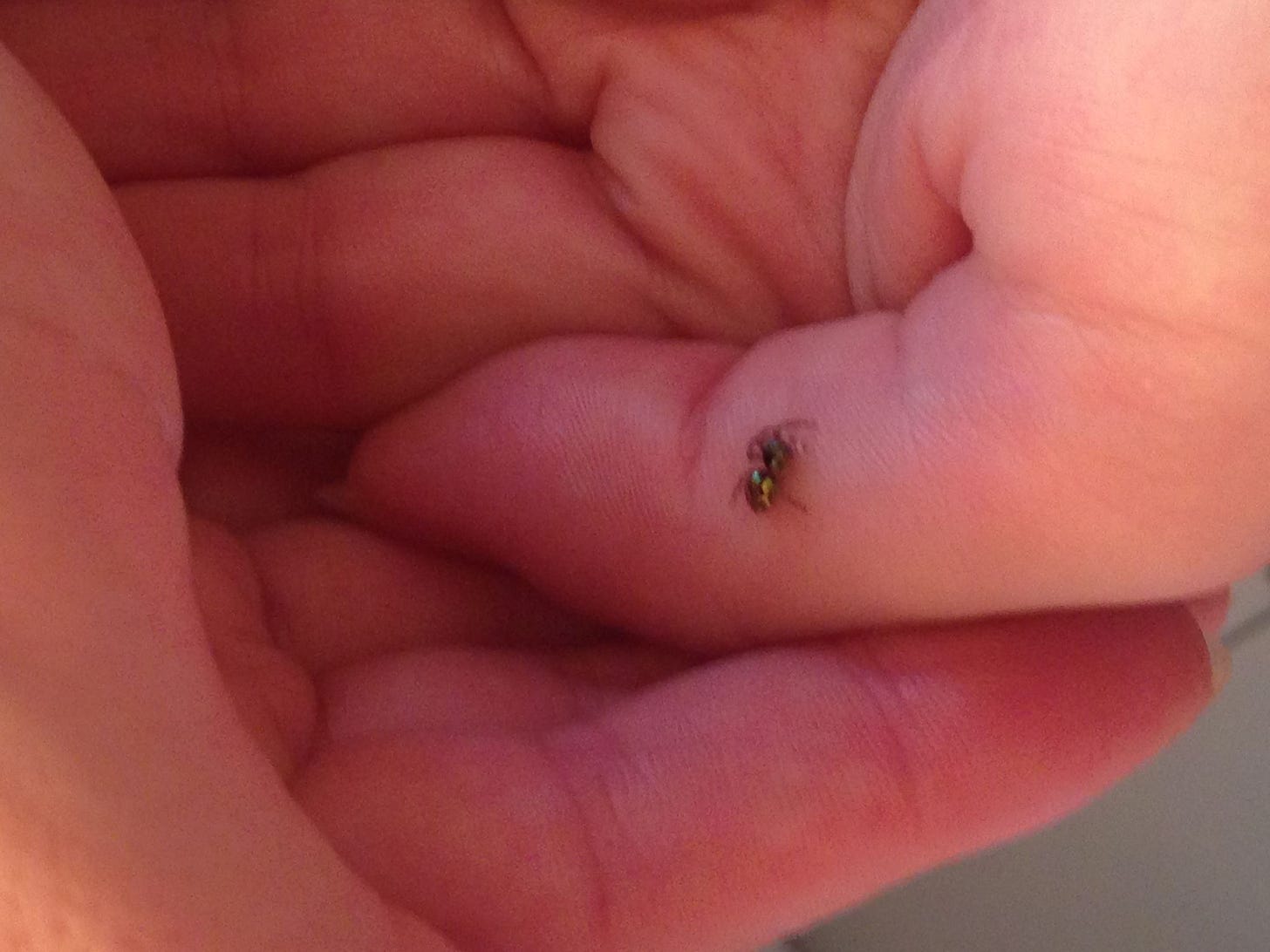Fifteen years ago, I was bitten by a brown recluse spider. Brown recluse bites are rare, and envenomations rarer, even in places where the spiders themselves are quite common. But I got lucky, I guess, because all the predictable sequelae of a recluse bite occurred: a chunk of my flesh died, the dead tissue got superinfected; recovery took a long time; and now I have a scar where the bite had been.1
At the time I was bitten, I knew what to do to minimize the damage right away, because I had extensively studied spiders, spider bites and venoms, ending up with 18 credit hours of upper-division arachnology coursework and a jaunt to an academic conference on spider classification by the time I graduated college. Why I did this is because I was phobic: just seeing a spider in a room would make me freeze, hyperventilate, and cry. And I knew I couldn’t go through life that way, so I took classes on spiders until I was over it. By the time I was bitten by the brown recluse, I could cheerily pick up spiders with my bare hands—a trick I can still do today, which is why it’s my job to relocate spiders from the house to outside.
Why I had studied so hard to get over my arachnophobia is because I read 1984.
George Orwell’s 1984 is having something of a moment right now, and it’s not hard to see why. There’s the head-spinning pace at which language changes, with new rules all are expected to abide by, but never formally acknowledge, akin to Orwell’s Newspeak. There’s the internet-enabled collective amnesia of events similar to a disappearance down a memory hole. But what got me to study spiders back in the 1990s, before these parallels seemed so salient, were not those aspects of 1984, but another feature of its plot: Room 101.
Room 101 was where those who defied Oceania’s despotic state were broken by being confronted by their personal worst fear. For 1984 protagonist Winston Smith, that was rats, and it was being threatened with rats that made him betray his love Julia. My Room 101 would have been occupied by spiders, and that’s why I knew I had to empty it, by learning enough to no longer be afraid. If I didn’t have a fear to be exploited, I wouldn’t be so easy to control.
I was so naive.
Another feature of the world of 1984 is the two-minute hate. In the novel, the people of Oceania are further controlled by being forced every day to watch videos of enemies and focus their feelings of rage towards the other. In the novel, during the two-minute hate everyone watches the same video.
This is also very naive.
No one has to be forced to watch videos that enrage them, and two minutes per day is far less time than we’d choose to do all on our own. On average, we’re spending about seven hours a day interacting with the internet, and about 2.5 hours per day of that is spent on social media2. I don’t know that there’s a good measure of how much of that time we spend on things we hate, but I do know that internet algorithms are designed to maximize our engagement, and that things that inspire hatred and disgust reliably achieve that end. I know from my personal experience, as I’m sure you do from yours, that I am shown many things by social media every day that seem designed to make me angry.
Hatred is a much better emotion to use to control people than fear is. Fear makes you feel weak; hate makes you feel strong. Fear is paralyzing; hate makes you want to Do Something. Acting out of hate can feel righteous and pure. There is nothing fun about fear, but hatred is a riot.
So of course we choose to spend time watching things that inspire hate. Not that we are being shown the same things, you and I. Oh no. We are each being served our own bespoke collection of hatreds, curated in an increasingly sophisticated way to cater best to our worst impulses. It’s not an individualized fear that can be used to control you, in your own Room 101, but an individualized hatred.
Fear is obvious when you feel it, but hatred can be subtle. It’s not just the shouting at a screen that Orwell shows in his novel. It can be a slow set of impressions of disgust, a set of nuanced arguments with yourself about why some of your fellow human beings are irredeemably other, an enemy it is morally justified to hurt. Being reinforced with your own personalized two-hour hate, in no time at all it will feel impossible that any person of good will could come to different conclusions than your own. The circle of untrustworthy others will widen as the definition of goodness and moral purity shrinks to a tiny dot. The hatred toward the others in that widening gyre will seem increasingly justified, as will whatever arbitrary punishments are doled out to them. While in fictional 1984, a system of state spies and cameras was employed to root out dissidents, in actual 2024 we do this ourselves using our own cameras and social media accounts. You pay for cloud storage so you can more efficiently do Big Brother’s work for him.
You don’t recognize Room 101 when you walk into it of your own free will. The only item in there is a mirror.
So how do you get out? How are we3 going to escape?
Well, I don’t know how to hack an engagement-maximizing algorithm, but I do know a lot about spiders.
There are more than 50,000 known species of spiders, and new ones are being discovered all the time. Spiders are known for spinning webs, but only about half of spider species actually make webs, although all can make silk. Spider silk is stronger and softer than silkworm silk, but hasn’t been developed into a product because spiders are too difficult to breed in captivity. Most spiders are solitary, but there are social spiders with collective webs housing thousands of individuals, who hunt cooperatively and share childcare duties. Wolf spiders are great moms, carrying their babies on their backs and going to search for any child who falls off. Jumping spiders have binocular vision like humans do. They’re fluffy and have expressive eyebrows and do adorable dances for each other. They look like tiny kittens when they clean themselves. I love them.
There are approximately 3 million spiders for every human being on planet Earth right now. There is likely less than one human death a year that’s caused by spider bite. Yet arachnophobia is one of the most common phobias, affecting 5 - 10% of the adult population. It’s often attributed to having had a traumatic encounter with a spider, but this is absurd: trauma caused to humans by spiders virtually never occurs. Certainly, in my case, the phobia preceded the trauma by decades. And after my trauma occurred, I still love them. My fear and loathing of spiders was never about the truth about spiders, but about a flaw in myself.
Spiders are very easy to empathize with, once I started to understand more about them. And this is a trope because it is true.
If there is a way out of Room 101, it must be in empathy even for, especially for, those we loathe and fear. We should steelman the arguments with which we disagree. We should try to understand the perspectives we loathe and the people who have them, not with a flimsy, condescending pity, but compassion. This is not relativism but humility. This is not surrender to a vague, dehumanized, but actually human “enemy,” but an act of defiance against a digital Big Brother that would lock us forever in cells of maximal engagement, and personalized hate.
If I can learn to love a brown recluse, I can learn to love my enemies.
Fifteen years ago, I killed a spider on accident, and in her dying throes, she bit me. I will carry the scar from that for the rest of my life. But I have never been bitten by a spider I held in my hand.
That I later covered with a tattoo of a spider, because why not?
I am using “you” and “we” as the pronouns to whom this is addressed because I believe the problem of bespoke hatreds causing us to dehumanize our fellow children of God is one that affects virtually everyone online, including myself and my friends, both in real life and exclusively online, and both left- and right-wing. If you are of a particular political persuasion and are convinced that the other side is much worse than yours is on this score, I am afraid that you are wrong.






The best way to defeat your enemies is by making them into friends.
I got stung by a yellowjacket twonorvthreecweekscago. My hand swelled up alarmingly like a cartoon Mickey Mouse hand. But although the little critter was bent over stinging, I didn't swat or mash it. I just firmly brushed it off. Never would dream it an enemy.